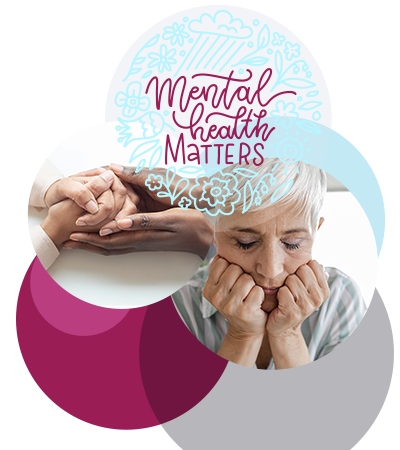Depression
If you are thinking of hurting yourself, call a suicide hotline right away
- San Mateo County Crisis Hotline: 650-579-0350
- National Suicide Prevention Lifeline: Call or text 988
- Emergency Response: Call 911 if you or someone you know is in a life-threatening emergency
Feeling sad is a normal response to challenging times in our lives, and usually these feelings pass. When these feelings of sadness last for more than a few weeks and get in the way of your normal routine, it could be a sign of depression.
Depression causes symptoms that affect how a person feels, thinks, behaves and manages daily activities. Depression is a common mental health disorder and can affect people in different ways. For some people, treatment may be recommended to treat their depression. Click on the links below to learn more.
Symptoms of depression
People with depression experience symptoms that last nearly everyday for two weeks or more. Some common symptoms of depression, according to the National Institute of Mental Health (NIMH), include:
- Sadness or anxiety
- Hopelessness
- Irritability or frustration
- Loss of interest in usual pleasures and activities
- Tiredness and loss of energy
To learn more about the symptoms of depression, visit the Centers for Disease Control (CDC) website.
Types of depression
The type of depression depends on how intense the symptoms are, how often they happen and how long they last. Only your primary care provider (PCP) or a trained mental health provider can diagnose depression.
Visit the National Institute on Mental Health (NIMH) website to learn more about the different types of depression.
How to find out if you need help
Recognizing the symptoms of depression is the first step to asking for help. If you believe you are experiencing symptoms of depression, talk to your PCP about how you are feeling. During your visit, your PCP may:
- Ask you to share more about your symptoms. They may have you complete a standardized screening tool or questionnaire.
- Complete a clinical assessment (e.g., review your medical history, perform a physical exam, order a lab draw) to rule out other health conditions that can cause symptoms of or similar to depression.
- Provide recommendations to help you manage your condition and feel better.
For mental health or substance use treatment referrals, call the BHRS ACCESS Call Center at 1-800-686-0101. TDD users call 1-800-943-2833. If your call isn’t answered live, please leave a message with your name and call-back number and someone from BHRS will return your call.
You can also take a free, online depression assessment now
Mental Health America’s 10-question depression screening tool is confidential. It only takes a couple of minutes to fill out. You will get a score ranging from zero (least depressed) to 27 (most depressed). While this is not a diagnosis, your score may help you understand your symptoms and if you need help urgently. You can also share and discuss your score with your PCP. Mental Health America’s website also has many useful self-help tips for dealing with depression and other mental health issues.
Depression and suicide
One symptom of depression can be suicidal thoughts, which is when people have thoughts of hurting themselves or ending their life. If you (or someone you know) has suicidal thoughts, has a suicide plan or makes a suicide attempt, it is an emergency, and you need help immediately. Either call 911 or the Suicide & Crisis Lifeline at 988 to speak with a counselor. Lifeline counselors are available 24 hours a day, 7 days a week.
Some common suicide warning signs include:
- Thoughts or talk of harming self, death or suicide
- Talk of being a burden to others
- Sadness or hopelessness
- Withdrawing from or saying goodbye to loved ones
- Using drugs or alcohol more often than usual
To learn more about the warning signs of suicide, visit the National Institute of Mental Health (NIMH) website.
Find out how to get mental health care, learn about common mental health issues and find self-help resources
Call HPSM’s Nurse Advice Line
If you are worried about your health, HPSM has a Nurse Advice Line open 24 hours a day, 7 days a week. Call 1-833-846-8773 if your healthcare provider is not available.
Registered nurses are ready to answer questions about your symptoms. They can tell you:
- How soon to see a healthcare provider
- What to do if your symptoms get worse
- What you can do at home to start feeling better
